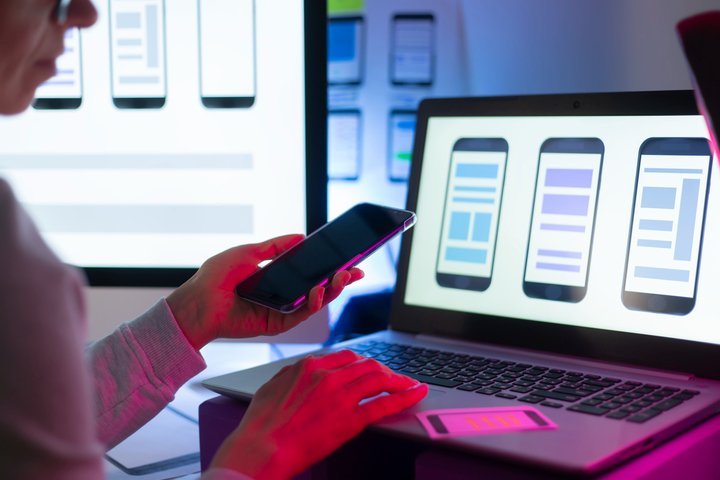The integration of blockchain technology into various industries has been nothing short of revolutionary, and its impact on mobile app development is no exception. Originally designed as the underlying technology for cryptocurrencies, blockchain has evolved into a versatile and secure solution with applications far beyond digital currencies. In this blog post, we explore the profound role of blockchain in mobile apps, shedding light on how this decentralized technology is reshaping the landscape of mobile application development.
Understanding Blockchain Technology
a. Decentralization and Distributed Ledger
At its core, blockchain is a decentralized and distributed ledger that records transactions across a network of computers. This ledger, comprised of blocks linked in a chronological chain, is secure, transparent, and resistant to tampering. Each participant in the network holds a copy of the entire ledger, ensuring a shared and trustless system.
b. Smart Contracts
Smart contracts, self-executing contracts with the terms of the agreement directly written into code, are a fundamental aspect of blockchain technology. They automate and enforce the execution of contractual agreements, eliminating the need for intermediaries and enhancing the efficiency of transactions.
Enhancing Security in Mobile Apps
a. Immutable Data Records
Blockchain’s immutability ensures that once data is recorded on the blockchain, it cannot be altered or deleted. This characteristic is particularly valuable in mobile apps where data integrity is crucial. By leveraging blockchain, developers can create tamper-resistant systems, reducing the risk of unauthorized modifications to user data.
b. Secure Identity Management
Blockchain enhances identity management in mobile apps by providing a decentralized and secure way to manage user identities. Users have control over their personal information, and the need for centralized databases with vulnerable points of attack is mitigated. This is especially pertinent in applications requiring identity verification, such as healthcare and finance.
Transparent and Traceable Transactions
a. Financial Applications
Blockchain’s transparency and traceability make it a natural fit for financial applications within mobile apps. Cryptocurrencies and decentralized finance (DeFi) apps utilize blockchain to enable secure and transparent transactions, reducing the risk of fraud and providing users with real-time visibility into their financial activities.
b. Supply Chain Management
Mobile apps integrated with blockchain technology can transform supply chain management. Each supply chain step can be recorded on the blockchain, allowing for a transparent and traceable journey from production to the end consumer. This ensures accountability, reduces counterfeiting, and streamlines logistics.
Decentralized App (DApp) Development
a. Eliminating Centralized Points of Failure
Traditional mobile apps often rely on centralized servers, which can be vulnerable to cyber-attacks or downtime. Blockchain allows for the development of decentralized apps (DApps) that operate on a peer-to-peer network, eliminating single points of failure and enhancing the robustness of the application.
b. Tokenization and Incentive Models
Blockchain facilitates the creation of tokenized ecosystems within mobile apps. Developers can tokenize assets or introduce native tokens, creating incentive models for user engagement. This tokenization can be leveraged for loyalty programs, in-app rewards, or even creating decentralized marketplaces.
Improved User Privacy
a. User-controlled Data
Privacy concerns have become a focal point in today’s digital landscape. Blockchain empowers users to have more control over their data. With the implementation of decentralized identity solutions, users can selectively share their information without compromising their privacy.
b. Zero-Knowledge Proofs
Advanced cryptographic techniques, such as zero-knowledge proofs, enable mobile apps to verify information without revealing the actual data. This adds a layer of privacy, allowing for secure interactions without exposing sensitive information.
Challenges and Considerations
a. Scalability
Blockchain networks, especially public ones, face challenges related to scalability. The transaction processing speed and capacity of some blockchain networks may not meet the demands of high-traffic mobile applications. Solutions like layer 2 scaling solutions and sidechains are being explored to address this issue.
b. User Experience
The complexity of blockchain technology can pose challenges to the user experience. From wallet management to understanding transaction confirmations, there’s a learning curve for users unfamiliar with blockchain. Simplifying these processes is essential for widespread adoption.
c. Regulatory Landscape
The regulatory environment surrounding blockchain and cryptocurrencies varies globally. Mobile apps incorporating blockchain need to navigate through these regulatory landscapes, ensuring compliance with legal requirements in different jurisdictions.
Use Cases and Examples
a. Cryptocurrency Wallets
Mobile apps that serve as cryptocurrency wallets leverage blockchain technology to securely store users’ private keys and facilitate transactions. These apps provide a user-friendly interface while ensuring the security of digital assets.
b. Decentralized Social Media
Blockchain has inspired the development of decentralized social media platforms. These platforms use blockchain for content monetization, data ownership, and transparent moderation policies, giving users more control over their online presence.
c. Healthcare Records Management
Mobile apps in the healthcare sector are exploring blockchain for managing electronic health records (EHRs). Blockchain ensures the integrity and security of health data, allowing patients to share their records securely with healthcare providers.
d. Gaming and NFTs
Blockchain is disrupting the gaming industry by enabling the creation of non-fungible tokens (NFTs). Mobile games can integrate blockchain for tokenized in-game assets, allowing players to truly own and trade their digital items.
The Future of Blockchain in Mobile Apps
The role of blockchain in mobile apps is poised for continued growth and innovation. As blockchain technology matures and more developers embrace its potential, we can expect to see a proliferation of decentralized solutions across diverse industries. Integrating blockchain into mobile app development is not just a trend; it represents a paradigm shift toward more secure, transparent, and user-centric applications.
Conclusion
The integration of blockchain technology into mobile app development marks a pivotal moment in the evolution of digital solutions. From enhancing security and privacy to transforming financial transactions and decentralized app development, blockchain’s impact is far-reaching.
As developers continue to explore the possibilities, the role of blockchain in mobile apps will continue to shape the future of a more decentralized, secure, and user-centric digital landscape. The journey has just begun, and the fusion of blockchain and mobile apps holds the promise of unlocking new dimensions of innovation and user empowerment.






